Renewed Research Stay Testimonials
Cora Granata, Associate Professor of History and Associate Director, Center for Oral and Public History, California State University Fullerton (BUKA, History, 1998)
My Humboldt renewed research stay advanced an oral history research project I am directing called “From Hitler’s Europe to the Golden State.” Before my research stay, I had collected 30 oral histories with Germans who lived through the Third Reich and Second World War in Europe and later migrated to Southern California. 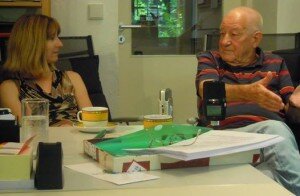 During my research stay, I widened the project with a comparative aspect and conducted 12 oral histories with Germans of a similar cohort who did not permanently emigrate in the postwar period. These were individuals who stayed in Germany, but who engaged with the topic of emigration during their postwar lives—whether they considered emigrating, had contacts with friends or relatives who left Germany in the early postwar years, or emigrated themselves for a time before returning to Germany. The project analyzes the ways in which migration has shaped postwar German memory cultures. I was hosted by two institutions, the Freie Universität and the Zeitzeugenbörse. While in Berlin, I also established close ties with a community oral history project called “Die Lange Tafel Berlin”—an innovative project that has organized popular oral history-based performances and public festivals in Berlin and other German cities for ten years. I am now working with the Berlin Senate and the Berlin-Los Angeles sister city partnership and aim to bring “Die Lange Tafel” to Los Angeles. I advise fellow Humboldtians who wish to apply for a renewed research stay to start early with developing contacts with potential hosts and to maintain consistent contact with their previous hosts.
During my research stay, I widened the project with a comparative aspect and conducted 12 oral histories with Germans of a similar cohort who did not permanently emigrate in the postwar period. These were individuals who stayed in Germany, but who engaged with the topic of emigration during their postwar lives—whether they considered emigrating, had contacts with friends or relatives who left Germany in the early postwar years, or emigrated themselves for a time before returning to Germany. The project analyzes the ways in which migration has shaped postwar German memory cultures. I was hosted by two institutions, the Freie Universität and the Zeitzeugenbörse. While in Berlin, I also established close ties with a community oral history project called “Die Lange Tafel Berlin”—an innovative project that has organized popular oral history-based performances and public festivals in Berlin and other German cities for ten years. I am now working with the Berlin Senate and the Berlin-Los Angeles sister city partnership and aim to bring “Die Lange Tafel” to Los Angeles. I advise fellow Humboldtians who wish to apply for a renewed research stay to start early with developing contacts with potential hosts and to maintain consistent contact with their previous hosts.
Jennifer Gerend, Member of the Faculty, Evergreen State College (BUKA, Town and Country Planning, 2006)
Because I am a mother and a professor, timing is increasingly important in balancing my research agenda with the demands of raising a child. I just completed a large research project in the U.S. and became eligible for my first 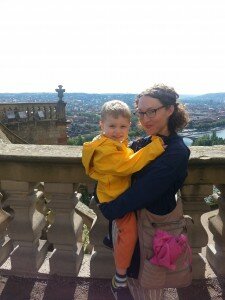 sabbatical. This was also the last year before my son begins elementary school. The timing was perfect for a renewed research stay in many ways. I follow city planning and retail development, especially downtown revitalization. Germany is experiencing some of the same challenges as many U.S. cities: oversupply of retail space, struggling department stores and new impacts from e-commerce on “brick and mortar” retail. However, German planning instruments and academic research in retail planning and geography (Handelsgeographie) are very strong. Also, some cities are currently using their city marketing programs to try to counter internet shopping; is this savvy or naive? I am beginning to synthesize the most recent German research and developments in these areas for English-language scholarly audiences and practitioners. Check for a university with accommodations for visiting international researchers. If you are bringing kids, the university pre-school/ nursery is also used to visiting children of international guests for limited stays – including children who do not speak German. Finally, don’t be afraid to bring little kids. My 4-yr old son is now a huge fan of streetcars, Hausschuhe, and Schnitzel.
sabbatical. This was also the last year before my son begins elementary school. The timing was perfect for a renewed research stay in many ways. I follow city planning and retail development, especially downtown revitalization. Germany is experiencing some of the same challenges as many U.S. cities: oversupply of retail space, struggling department stores and new impacts from e-commerce on “brick and mortar” retail. However, German planning instruments and academic research in retail planning and geography (Handelsgeographie) are very strong. Also, some cities are currently using their city marketing programs to try to counter internet shopping; is this savvy or naive? I am beginning to synthesize the most recent German research and developments in these areas for English-language scholarly audiences and practitioners. Check for a university with accommodations for visiting international researchers. If you are bringing kids, the university pre-school/ nursery is also used to visiting children of international guests for limited stays – including children who do not speak German. Finally, don’t be afraid to bring little kids. My 4-yr old son is now a huge fan of streetcars, Hausschuhe, and Schnitzel.
Tim Angelotti, Associate Professor, Department of Anesthesia/Critical Care Medicine, Stanford University (STP, Pharmacology, 1995)
Ever since my first postdoctoral experience as a Humboldt Fellow in 1995, I always knew that I was destined to return to Germany. Fortunately, I was able to realize my dream about 18 years later as a 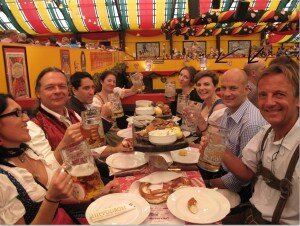 Renewed Research Fellow supported by the Alexander von Humboldt Foundation. I took the chance to move into a new area of investigation, specifically bioinformatics and computational biology, to enhance my research career. I was fortunate to find a great host and host lab at the Technische Universität München, under the guidance of Dr. Burkhard Rost. My wife, a German-American, was able to realize her Urgroßmutter’s dream that she live in Germany. I felt revitalized by the opportunity to focus solely on research, and publications, while delving into a new scientific area, without any of the responsibilities of my home department. We made many friends, experienced many wonderful German traditions, and now are trying to find ways to come back again. Germany changed our worldview and our approach to life. Thanks to the Humboldt Foundation, we had the experience of a lifetime and many cherished memories.
Renewed Research Fellow supported by the Alexander von Humboldt Foundation. I took the chance to move into a new area of investigation, specifically bioinformatics and computational biology, to enhance my research career. I was fortunate to find a great host and host lab at the Technische Universität München, under the guidance of Dr. Burkhard Rost. My wife, a German-American, was able to realize her Urgroßmutter’s dream that she live in Germany. I felt revitalized by the opportunity to focus solely on research, and publications, while delving into a new scientific area, without any of the responsibilities of my home department. We made many friends, experienced many wonderful German traditions, and now are trying to find ways to come back again. Germany changed our worldview and our approach to life. Thanks to the Humboldt Foundation, we had the experience of a lifetime and many cherished memories.
Robert Ericksen, Kurt Mayer Chair in Holocaust Studies, Pacific Lutheran University (STP, History, 1986)
I received my first award from the Alexander von Humboldt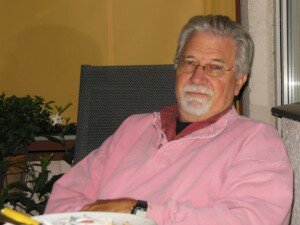 Foundation in 1986. Since then, I have occasionally benefited from additional support. That included research time in Germany when I completed my latest book, Complicity in the Holocaust: Churches and Universities in Nazi Germany (Cambridge University Press, 2012). I am now in the midst of another three-month research opportunity while I complete a second project for Cambridge University Press. This book will appear as Christians in Nazi Germany in their Short History Series, either in 2015 or 2016.
Foundation in 1986. Since then, I have occasionally benefited from additional support. That included research time in Germany when I completed my latest book, Complicity in the Holocaust: Churches and Universities in Nazi Germany (Cambridge University Press, 2012). I am now in the midst of another three-month research opportunity while I complete a second project for Cambridge University Press. This book will appear as Christians in Nazi Germany in their Short History Series, either in 2015 or 2016.
The main focus of my work, ever since my first book, Theologians under Hitler: Gerhard Kittel, Paul Althaus and Emanuel Hirsch (Yale University Press, 1985), has involved two major institutions, church and university, and their responses within Germany to the Nazi period. My contribution has been to point toward complicity, rather than resistance. It is a complicated story. There were heroic resisters. Also, all Germans lived under various forms of Nazi coercion. However, the important part of the story for me has been to try to unpack the reasons why so many found the rise of Hitler genuinely attractive.
Support from the Alexander von Humboldt Foundation has always been helpful and generous, even for brief stints. I get to meet other Humboldtians, often on an outing of some sort. The monthly stipend is helpful, of course. I recommend this opportunity to all former Humboldtians.
Julian Andrzej Domaradzki, Professor, Department of Aerospace and Mechanical Engineering (USS, Fluid dynamics, aeroelasticity, 1980)
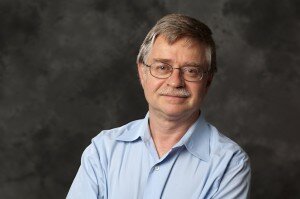 The main motivation was to maintain a close collaboration with Prof. Adams’ group in the Institute of Fluid Mechanics and Aerodynamics at the Technical University Munich, which is very active and known worldwide in the field of fluid dynamics. My collaboration with German colleagues has been continuing for over 20 years and resulted in several significant advances in methods used to simulate numerically fluid flows.
The main motivation was to maintain a close collaboration with Prof. Adams’ group in the Institute of Fluid Mechanics and Aerodynamics at the Technical University Munich, which is very active and known worldwide in the field of fluid dynamics. My collaboration with German colleagues has been continuing for over 20 years and resulted in several significant advances in methods used to simulate numerically fluid flows.
The expertise of the TUM group in numerical methods led me to propose a new approach to numerical simulations of fluid flows that properly accounts for the intrinsic dissipation of numerical codes, leading to an increase in accuracy of numerical results. My interactions with members of Adams’ group allowed me to make a significant progress in my research in a very short time of three months. Overall, my research stay at TUM has been very productive, resulting in one accepted journal publication and another submitted
Separately, the support for my visit at TUM was excellent, beginning with an invaluable assistance in finding an apartment, through welcoming atmosphere in the Institute and, more generally, at TUM and in everyday life in Munich. It was an experience I would gladly repeat.
Renewed research stays are often quite hectic, with many opportunities for personal travel, visiting other universities in Germany and neighboring countries, as well as a need to supervise own research group at a home institution. Because of that it is important to decide on a research topic at a host institution and start preparations well in advance so that the project has a reasonable chance of success in a limited period of time.
Edward Frederick Fischer, Director, Center for Latin American Studies and Professor of Anthropology at Vanderbilt (STP, Cultural Anthropology, 2005)
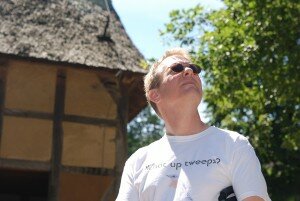 I received a renewed Humboldt research stay award in 2012 to work at the Max-Planck-Institut für Gesellschaftsforschung with Prof. Jens Beckert. It was an incredible research stay. The MPIfG houses an amazing group of researchers focusing on issues of society and economics. Interacting with the other MPIfG researchers gave me many new ideas. During my stay I was able to finish the research and writing for my new book, The Good Life: Aspiration, Dignity, and the Anthropology of Wellbeing. This book looks at what the good life means for middle-class German consumers as well as poor Maya farmers in Guatemala, uncovering common elements of well being in these two very different places and cultures. Details on the book may be found at http://www.sup.org/book.cgi?id=24105. I also blog about my research at http://anthropologicalobservations.blogspot.com/
I received a renewed Humboldt research stay award in 2012 to work at the Max-Planck-Institut für Gesellschaftsforschung with Prof. Jens Beckert. It was an incredible research stay. The MPIfG houses an amazing group of researchers focusing on issues of society and economics. Interacting with the other MPIfG researchers gave me many new ideas. During my stay I was able to finish the research and writing for my new book, The Good Life: Aspiration, Dignity, and the Anthropology of Wellbeing. This book looks at what the good life means for middle-class German consumers as well as poor Maya farmers in Guatemala, uncovering common elements of well being in these two very different places and cultures. Details on the book may be found at http://www.sup.org/book.cgi?id=24105. I also blog about my research at http://anthropologicalobservations.blogspot.com/
Brian Mitchell, Professor, Department of Chemical and Biomolecular Engineering, Tulane University (STP, Process Engineering, 2003)
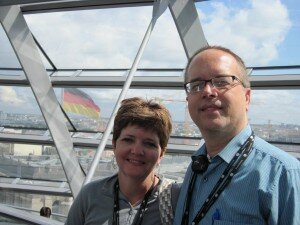 I applied for an AvH Renewed Research Stay nearly ten years after my initial fellowship in 2003. With the assistance of another Humboldtian serving as my host and collaborator, I was able to visit the Max Planck Institute for Colloids and Interfaces (MPIKG) during the summer of 2012. There my host and I worked with one of his postdoctoral fellows on a new method of forming functionalized semiconductor nanoparticles using sonochemistry. The MPKIG has great facilities and personnel on a beautiful new campus outside of Potsdam. My wife accompanied me as she has on previous research visits, and we stayed in the convenient MPIKG housing facilities. We always enjoy the opportunities to travel these visits provide us, and were fortunate enough to be near Berlin to attend the AvH Annual Meeting in June. The reason for my return visit at this point in my career was simple. I had entered higher education administration six years prior to that while continuing my faculty appointment in chemical engineering, and by 2012 felt that my research needed a “kick start.” The Renewed Research Stay provided a non-sabbatical opportunity for me to explore a new research area at one of the premier technical institutions in Germany. My advice to Humboldtians is to use these short-term stays as a way to generate preliminary research results for a proposal or to extend a sabbatical stay beyond what your university might normally fund.
I applied for an AvH Renewed Research Stay nearly ten years after my initial fellowship in 2003. With the assistance of another Humboldtian serving as my host and collaborator, I was able to visit the Max Planck Institute for Colloids and Interfaces (MPIKG) during the summer of 2012. There my host and I worked with one of his postdoctoral fellows on a new method of forming functionalized semiconductor nanoparticles using sonochemistry. The MPKIG has great facilities and personnel on a beautiful new campus outside of Potsdam. My wife accompanied me as she has on previous research visits, and we stayed in the convenient MPIKG housing facilities. We always enjoy the opportunities to travel these visits provide us, and were fortunate enough to be near Berlin to attend the AvH Annual Meeting in June. The reason for my return visit at this point in my career was simple. I had entered higher education administration six years prior to that while continuing my faculty appointment in chemical engineering, and by 2012 felt that my research needed a “kick start.” The Renewed Research Stay provided a non-sabbatical opportunity for me to explore a new research area at one of the premier technical institutions in Germany. My advice to Humboldtians is to use these short-term stays as a way to generate preliminary research results for a proposal or to extend a sabbatical stay beyond what your university might normally fund.
Ivan Raykoff, Associate Professor of Music, The New School (BUKA, Musicology, music, 1999)
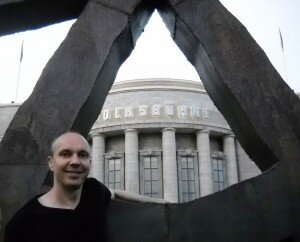 I returned to Berlin for my sabbatical in the fall of 2012 to research the theory and practices of “visual music” (Farbe-Ton-Forschungen) in 1920s Germany. This research embraces early 20th-century approaches to synesthesia, and I wanted to understand this work from the perspective of sensory perception, or “perceptual practices,” in relation to artistic and musical creativity. During my three months in Berlin I made new connections with scholars in this area, especially Prof. Claudia Albert at the FU Berlin, a contributor to the recent set of studies titled Audiovisuology. I had a very good rapport with my sponsor, Prof. Tobias Plebuch at the HU Berlin, as we traded our recent publications and project ideas on film music studies. I also discussed the topic with Dr. Zeynep Bulut, a fellow at the Berlin Institute for Cultural Inquiry, whose ideas on voice and tactility inspired some of my other work on music and touch in relation to the Romantic pianist. After this semester in Berlin, I had ample materials to teach and research further in Vienna, Austria, in spring 2013, when I was a Fulbright Visiting Professor at the Musicology Department of the University of Vienna. In Vienna, another important home for visual music creativity in the 1920s, I taught a seminar on Visual Music drawing upon the insights I had gained during my Humboldt renewal semester in Berlin. My sincere thanks to the Alexander von Humboldt Foundation, both the Bonn and Washington DC offices, for helping to make this productive and enjoyable semester of research in Berlin possible!
I returned to Berlin for my sabbatical in the fall of 2012 to research the theory and practices of “visual music” (Farbe-Ton-Forschungen) in 1920s Germany. This research embraces early 20th-century approaches to synesthesia, and I wanted to understand this work from the perspective of sensory perception, or “perceptual practices,” in relation to artistic and musical creativity. During my three months in Berlin I made new connections with scholars in this area, especially Prof. Claudia Albert at the FU Berlin, a contributor to the recent set of studies titled Audiovisuology. I had a very good rapport with my sponsor, Prof. Tobias Plebuch at the HU Berlin, as we traded our recent publications and project ideas on film music studies. I also discussed the topic with Dr. Zeynep Bulut, a fellow at the Berlin Institute for Cultural Inquiry, whose ideas on voice and tactility inspired some of my other work on music and touch in relation to the Romantic pianist. After this semester in Berlin, I had ample materials to teach and research further in Vienna, Austria, in spring 2013, when I was a Fulbright Visiting Professor at the Musicology Department of the University of Vienna. In Vienna, another important home for visual music creativity in the 1920s, I taught a seminar on Visual Music drawing upon the insights I had gained during my Humboldt renewal semester in Berlin. My sincere thanks to the Alexander von Humboldt Foundation, both the Bonn and Washington DC offices, for helping to make this productive and enjoyable semester of research in Berlin possible!
Christopher Seitz, Professor of Biblical Interpretation, Wycliffe College, University of Toronto (STP, Theology, 1991)
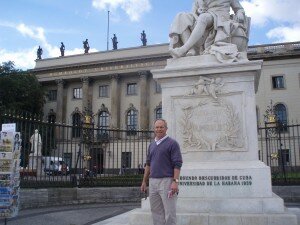 I first heard about the renewed research stay from a colleague from Scotland who was already taking advantage of the program. I wondered if it was possible me and began researching possible hosts. My original Humboldt fellowship was in Munich, and I was only able to take 6 months of the 2 year grant due to restrictions at Yale University, so I had always been very interested in returning, but I did not know the renewal was available. My host institution, the Georg-August University, was an excellent setting. The library facilities were superb, as were the staff at the University. Consequently, I was able to research and write from day one. The foundation found us a lovely house to rent. I completed 90% of the writing project in 3 months time. My advice to other Humboldtians would be to take advantage of this brilliant opportunity! The application process is very straightforward. In addition to the research time, AvH also hosted a visit to Berlin that was first-rate in quality and interest.
I first heard about the renewed research stay from a colleague from Scotland who was already taking advantage of the program. I wondered if it was possible me and began researching possible hosts. My original Humboldt fellowship was in Munich, and I was only able to take 6 months of the 2 year grant due to restrictions at Yale University, so I had always been very interested in returning, but I did not know the renewal was available. My host institution, the Georg-August University, was an excellent setting. The library facilities were superb, as were the staff at the University. Consequently, I was able to research and write from day one. The foundation found us a lovely house to rent. I completed 90% of the writing project in 3 months time. My advice to other Humboldtians would be to take advantage of this brilliant opportunity! The application process is very straightforward. In addition to the research time, AvH also hosted a visit to Berlin that was first-rate in quality and interest.
Marc Silberman, Professor, Department of German, University of Wisconsin, Madison (STP, German language and literature, German philology, 1982)
I was pleased to receive the support of the Humboldt-Stiftung for my research in summer 2014 at the Academy of Arts in Berlin, where I used archive holdings to help complete the editing and commentaries for two volumes of translations into English of Bertolt Brecht’s theater writings. I met the publisher’s deadlines, and the volumes will be 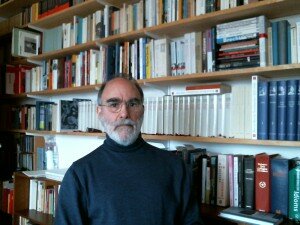 appearing later this year. My presence in the Brecht Archive enabled me to encounter a number of other international Brecht scholars who were also working there during my stay, thus increasing the network of contacts for the International Brecht Society, in which I am active. During the stay in Berlin I was also able to meet with or renew contacts with colleagues at the Humboldt-Universität, Freie Universität and Zentrum für Literatur- und Kulturforschung. Our discussions touched on topics that will concern me in conference presentations during the fall, including such issues as the impact of the 1989 “Wende” on my research agenda and on the nature of “interdisciplinary German studies” today. This was the third time in over two decades that I have taken advantage of the Humboldt alumni program. Each time the opportunity to further my research at a German institution and to make new contacts has been a complete success from my perspective. The Stiftung’s administration has been generous and extremely forthcoming in making such visits possible.
appearing later this year. My presence in the Brecht Archive enabled me to encounter a number of other international Brecht scholars who were also working there during my stay, thus increasing the network of contacts for the International Brecht Society, in which I am active. During the stay in Berlin I was also able to meet with or renew contacts with colleagues at the Humboldt-Universität, Freie Universität and Zentrum für Literatur- und Kulturforschung. Our discussions touched on topics that will concern me in conference presentations during the fall, including such issues as the impact of the 1989 “Wende” on my research agenda and on the nature of “interdisciplinary German studies” today. This was the third time in over two decades that I have taken advantage of the Humboldt alumni program. Each time the opportunity to further my research at a German institution and to make new contacts has been a complete success from my perspective. The Stiftung’s administration has been generous and extremely forthcoming in making such visits possible.

